Iran Says Its Exports To Iraq Rising Despite US Sanctions

Iran claims its exports to Iraq are on the rise approaching $10 billion despite pressure by the United States on Baghdad to stop the IRGC’s money smuggling from the Arab country to Iran.

Iran claims its exports to Iraq are on the rise approaching $10 billion despite pressure by the United States on Baghdad to stop the IRGC’s money smuggling from the Arab country to Iran.
Abdol-Amir Rabihavi, the business adviser of the Islamic Republic in Iraq, told IRNA that Iran's exports to Iraq have been growing, and by the end of the current Iranian year in March, this figure will reach 10 billion dollars.
He said the US has decreased the supply of dollars to the Iraqi market which previously was at least $250 million per day. “The average supply of dollars, which is completely controlled by Washington, is now between 79 million and 84 million dollars per day, and in fact, the United States is responsible for the sharp decrease in the supply of dollars in Iraq,” he said.
In early February, Iran International obtained information that revealed some details about the inner workings of a Revolutionary Guard’s Quds force unit tasked with smuggling money from Iraq to Iran.
Iran is apparently facing a serious shortage of foreign currencies. Its currency, the rial, has fallen by 50 percent in the past years and now stands at a historic low of 460,000 rials to one US dollar.
In January, Iraq’s currency also fell substantially against the US dollar leading to reports that US banks had instituted tougher review of transactions originating from Iraqi banks, leading to a shortage of dollars in Iraq.
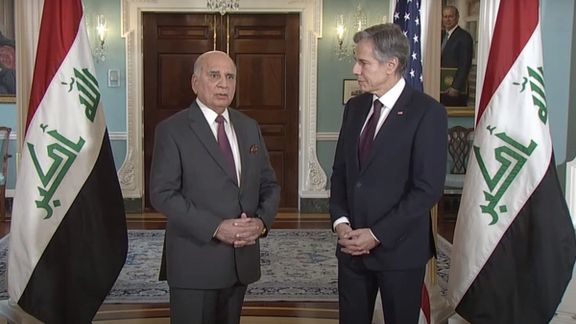
US officials have discussed banking and money laundering issues related to Iran with a high-ranking Iraqi delegation that visited Washington this week.
Deputy Prime Minister and Foreign Minister of Iraq, Fuad Hussein accompanied by Central Bank Of Iraq Governor Ali al-Allaq met with both the State Department and with Treasury to discuss a host of economic issues. But an urgent issue was how to prevent Iran from using Iraq’s banking ties with the United States to launder US dollars and circumvent Washington’s sanctions.
The outcome of the talks on this specific issue are not clear yet, but a statement from the US Department of the Treasury made it clear that the problem was among the main topics discussed.
The Treasury said that the two sides discussed the Iraqi “government’s plans for economic and financial sector reforms and a mutual commitment to anti-money laundering and countering the financing of terrorism (AML/CFT) measures.”
In January, Iraq’s currency fell substantially against the US dollar leading to reports that US banks had instituted tougher review of transactions originating from Iraqi banks, leading to a shortage of dollars in Iraq.
The Associated Press reported that the move was triggered a couple of months before to stamp out what Iraqi officials describe as rampant money laundering that benefits Tehran and Damascus which are under US sanctions.
According to information received by Iran International in early February, Iran’s Revolutionary Guard and the Islamic Republic’s embassy in Iraq are involved in the money laundering operations that aim to funnel the regime’s revenues from oil and gas exports back to Iran. As per a repeatedly extended sanctions’ waiver by Washington, Tehran is only allowed to import medicine and some essential goods in exchange for its exports of gas and electricity to its neighboring country.
According to a report by London-based newspaper Asharq Al-Awsat, the decline in the value of Iraq’s dinar and the accompanying price increases for foodstuffs and imported goods can be traced back to a remarkable change in the policy adopted by the US Treasury and the Federal Reserve Bank of New York.
To what extent these issue were resolved during the Iraqi delegation’s visit to Washington is not clear, but banking reforms were mentioned in statements and that shows this was a key topic in the discussions.
Iran is apparently facing a serious shortage of foreign currencies. Its currency, the rial, has fallen by 50 percent in the past years and now stands at a historic low of 500,000 rials to one US dollar.
Despite tougher implementation of US banking regulations by the Treasury, the tone of US officials was extremely deferential and respectful of the Iraqi government. State Department Spokesperson Ned Price during his briefing on February 9 described bilateral relations as one of close partners.
“Our relationship with the Government of Iraq is one based on partnership. It is one based on mutual respect. It is based on our mutual interests and what works to the benefit of both of our countries. It is not our approach…to issue demands, to issue decrees. When we engage with our Iraqi partners, we do often talk about the challenges that we confront in the region and well beyond. Many of those challenges are challenges to both of our interests. Iranian-backed forces in some cases pose a challenge to both of our interests,” Price told reporters.
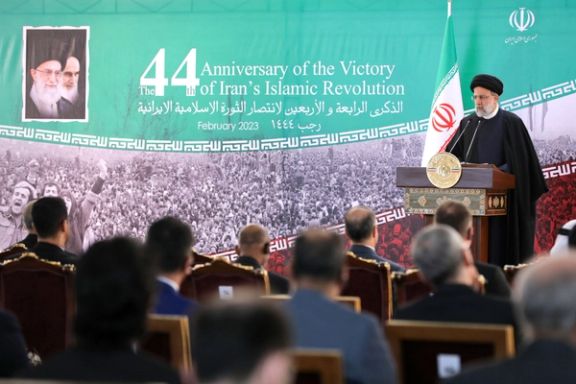
As the Islamic Republic is set for state-sponsored events for the 44th anniversary of its establishment on Saturday, European countries are calling for the boycott of the events.
In a statement on Thursday, members of several groups in the European Parliament and national parliaments called on European countries to boycott the ceremonies, and stand in solidarity with “the Iranian people who are fighting for their rights.”
Weeks before the anniversary of Islamic Republic’s establishment, a campaign was launched to boycott the regime’s ceremonies over the violent crackdown on nationwide protests sparked by the death in custody of Iranian Kurdish 22-year-old woman Mahsa Amini.
“We, cross-party Members of the European Parliament and Members of national parliaments, are urging the governments of the EU member states and the European External Action Service to boycott tomorrow's ceremony in Tehran for the anniversary of the Islamic revolution that brought this brutal regime to power. Likewise, EU officials ought to stay away from any such regime celebrations in Iranian embassies abroad,” read the statement.
The Islamic Republic government organizes 10 days of celebrations known as Fajr – literally meaning dawn – but the final day, February 11, is the most important one, in which the regime heavily invests. It already held an event on Thursday with a group of foreign ambassadors to the Islamic Republic with President Ebrahim Raisi in attendance. The government did not release the list of the participants but according to some reports envoys from European countries did not participate in the event – except for Hungary and Poland.
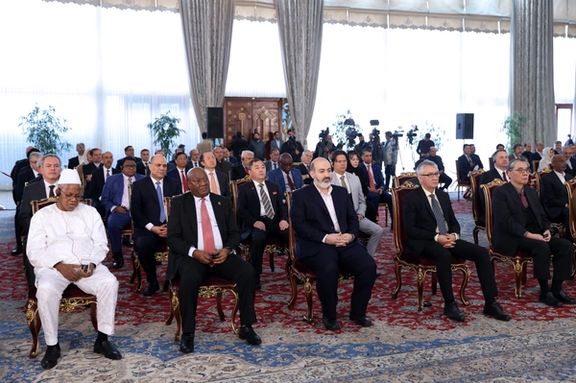
Dismayed by a lack of participation of Western envoys, Raisi said during the event that “The US and the three European countries [that are signatories to the 2015 nuclear deal] were caught up in a state of delusion and made miscalculations” by “meddling in Iran’s domestic affairs,” referring to the ongoing uprising.
Hailing the unanimity of European countries, US Senator Bob Menendez, Chairman of the Senate Foreign Relations Committee, tweeted, “Glad to see broad EU consensus against Islamic Revolution Day in Tehran, except from Orban’s Hungary, which all too regularly embraces autocrats, and Poland, whose silence is disappointing.”
“Nobody should be celebrating a regime with this much blood on its hands,” he added.
The statement by the MEPs added that “Over the past 44 years, the Islamic Republic has murdered tens of thousands of Iranians and has spread terror, misery and war throughout the region and beyond. Together with the Assad regime and Russia, the regime in Iran has carried out horrific war crimes in a conflict that has killed over 500,000 Syrians.”
The statement drew attention to the fact that hundreds of protesters have been killed, “for the 'crime' of demanding freedom, democracy and dignity and above all equal rights for women. Women and even young girls are being harassed, arrested, tortured, raped and murdered for simply refusing to wear the hijab or just for not fully covering their hair. At least 100 Iranians are facing the death penalty over their participation in protests following sham trials where the accused had just 15 minutes to defend themselves.”
Touching upon the growing military ties between Iran and Russia, the statement warned that “Tehran is now intensifying its growing alliance with Russia by supplying Moscow with Kamikaze drones designed to terrorize the Ukrainian people and to destroy their critical infrastructure.”
The MEPs said that celebrating “the rise to power of this odious regime” by European politicians and ambassadors -- even low-ranking diplomats -- would be “an inexcusable violation of our own values and a betrayal of the Iranian people as well as the regime's countless victims in the region and in Ukraine.
“Any official European participation in these celebrations would play into the hands of the Islamic Republic,” they said, adding that the mullahs would like nothing more than to demonstrate that despite their repression of the protests, it is "back to business as usual" with the EU.
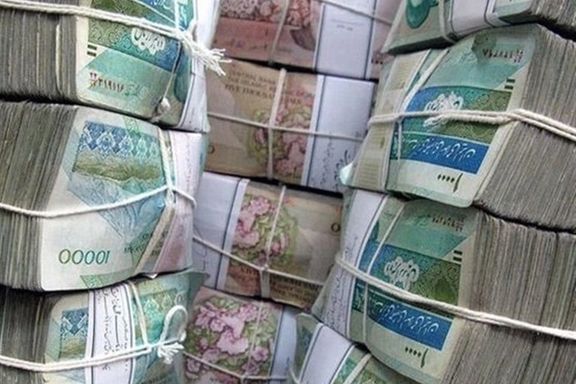
A top official of Iran’s tax administration says that tax collection this year has increased by 55 percent, as the government resorts to domestic revenue sources.
United States sanctions on oil exports, Iran’s main source of income, continue with Tehran shipping half as much oil as in the pre-sanction era and selling the oil at a steep discount.
Mojtaba Amiri a top official of tax administration was quoted by the official government news website IRNA as saying that in the first 10 months of current Iranian year, 3,880 trillion rials of all types of taxes have been collected. This would be in the range of $12-13 billion depending on how the exchange rate is calculated.
The government decided last year to boost tax revenues to offset its large chronic budget deficit in the absence of oil sufficient oil income. Iran needs around $50-60 billion in oil exports to balance its budget. Official figures indicate $37 billion of exports, while the reported steep discounts Iran offers to entice buyers cast doubt on the figure.
Amiri said that about two-thirds of tax revenues came from direct taxes, meaning income and business taxes and one third form “indirect taxes”, which could mean import, export and sales taxes.
He also claimed that tax collection targets were met by 113 percent, but earlier reports indicted a 60-percent tax collection success.
Amid a serious economic crisis, more taxes mean an additional burden on citizens and businesses, while major economic enterprises controlled by regime insiders are legally exempt from taxes.
Next years budget starting March 21 relies even more heavily on tax income.
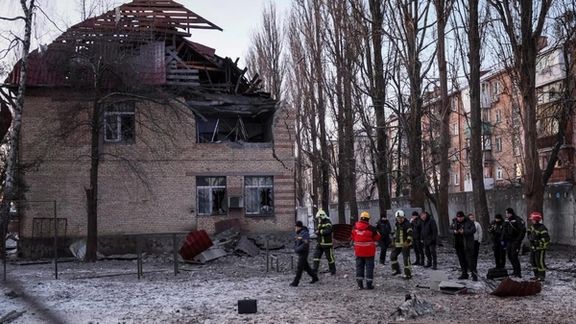
Dozens of US lawmakers have written to President Joe Biden to express concerns about reports that Iranian-made drones recovered in Ukraine contain parts manufactured in the United States.
In addition to President Biden, the letter was also addressed to Secretary of State Antony Blinken, Treasury Secretary Janet Yellen, and Secretary of Commerce Gina Raimondo and was signed by about 60 members of the US House of Representatives.
The letter is in line with earlier efforts by Western countries seeking to restrict the Islamic Republic’s access to parts used in building drones that Russia uses to attack Ukraine.
Voicing their deep concern, the lawmakers urge the Biden administration “to develop a coordinated, whole-of-government approach to interrupt Iran’s supply chains, shut down shell companies used by adversaries to evade sanctions, and pressure allies to crack down on unscrupulous distributors in Europe and Asia.”
They also called for “a timely briefing on any progress that has been made and plans going forward” about Washington’s efforts to curb the supply of drone parts.
“Iran has provided hundreds of drones to Russia since August 2022. The Shahed-136 and Shahed-131, one-way attack unmanned aerial vehicles also known as “suicide drones,” have terrorized Ukrainian civilians since their introduction into the conflict. Iran has also delivered to Russia the Mohajer-6, a surveillance drone capable of conducting precision air-to-ground strikes,” the letter read.
Conflict Armament Research investigations revealed that processors built by Dallas-based technology company Texas Instruments as well as engines made by Austrian firm owned by Canada’s Bombardier Recreational Products have been used in the drones.
Many parts are considered dual-use components and relatively easy to buy, without any approval needed.
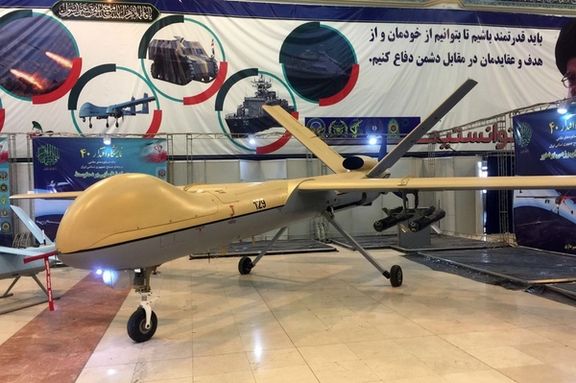
The representatives referred to the report by Conflict Armament Research that studied more than 500 components from Iranian-made drones and unexploded precision-guided munitions that were recovered in Ukraine, determining that “82 percent of their parts were manufactured by companies based in the United States.” Ukrainian intelligence services have estimated that 75 percent of the components of Iranian-made drones deployed in the conflict are US-made.
The signatories also mentioned the punitive measures taken by the Office of Foreign Assets Control on firms involved in the production and delivery of Iranian drones to Russia, describing the sanctions as “a small but promising first step in what must become a concentrated, sustained effort.”
“Just as the United States and its international allies rallied to implement a comprehensive sanctions regime to combat Iran’s ballistic missile program, it must do the same to degrade the regime’s precision-strike capabilities,” they urged.
They said Tehran’s fleet of drones have far-reaching implications beyond the war against Ukraine as such weapons “provide Iran and its proxies with yet another tool to project power in the region, threatening our troops, key allies, and freedom of navigation.”
Stressing the necessity of immediate action, they said the US should move not only to disrupt Iran’s burgeoning relationship with Russia, but also to blunt Iran’s ability to undermine international law, project power across the Middle East, and threaten US servicemembers.
Since December, Biden has launched a task force – comprised of different departments including Justice, Treasury, Defense, Commerce and State are involved in the task force -- to see how US and western components are ending up in Iranian drones.
In January, the Quebec-based company Bombardier Recreational Products (BRP), best known for water-skis and snowmobiles, passed to the Canadian government its internal report on how its engines ended up in Iranian-made drones used by Russia in Ukraine. The BRP said it has established through a “thorough investigation” that an engine found in a downed Mohajer-6 drone had not been sold directly to either Iran or Russia. Bombardier ended supplies of the engines to Iran in 2019, although the Mahtabal company in Tehran still markets itself as official representative for Rotax engines.
Earlier in the day, the adviser to Iran’s minister of intelligence claimed that 90 countries are "customers" of Iranian drones, and China is in the "queue" to receive 15,000 of these drones. The Wall Street Journal recently reported that an Iranian delegation has travelled to Russia to build a factory capable of producing six thousand UAVs designed by Tehran to be used in the war against Ukraine.

The United States imposed sanctions Thursday on companies it said that play a critical role in the production, sale and export of Iranian oil and petrochemicals.
Based on a new policy of increasing pressure on Tehran to reduce its illicit oil trade with China, the new sanctions targeted shipments to Asia.
The US Treasury Department in a statement said it imposed sanctions on six Iran-based petrochemical manufacturers or their subsidiaries and three firms in Malaysia and Singapore over the production, sale and shipment of hundreds of millions of dollars worth of Iranian petrochemicals and petroleum.
The latest US move against Iranian oil smuggling comes as efforts to revive Iran's 2015 nuclear deal have stalled and ties between the Islamic Republic and the West are increasingly strained as Iranians keep up anti-government protests.
Washington has announced a series of new sanctions since October.
"Iran is increasingly turning to buyers in East Asia to sell its petrochemical and petroleum products, in violation of U.S. sanctions," Treasury Under Secretary for Terrorism and Financial Intelligence Brian Nelson said in the statement.
"The United States remains focused on targeting Tehran’s sources of illicit revenue and will continue to enforce its sanctions against those who wittingly facilitate this trade," Nelson said.
China has been the main buyer of illicit Iranian oil since full sanctions were imposed by the Trump administration in May 2019.
The tougher approach by Washington is also motivated by Iran’s decision to supply military drones to Russia that are being used to target Ukraine’s civilian infrastructure.
The Biden Administration’s 18-month-long indirect talks with Iran to revive the 2015 nuclear deal (JCPOA) failed to produce a result at a time when popular protests broke out against the Islamic Republic and the use of its kamikaze drones by Russia was revealed in late September 2022. These three factors pushed the administration to say in October that it was no longer focused on reviving the JCPOA and its priority was supporting the rights of protesters in Iran.
Thursday's move targeted firms the Treasury accused of being involved in facilitating the sale and shipment of petroleum and petrochemicals on behalf of Triliance Petrochemical Co. Ltd., which was hit with sanctions by Washington in 2020.
Among the Iranian companies targeted were petrochemical producer Amir Kabir Petrochemical Co. (AKPC), its subsidiary Simorgh Petrochemical Co. and four subsidiaries of previously sanctioned Marun Petrochemical Co.
Treasury said Triliance has purchased millions of dollars worth of low-density polyethylene produced by AKPC for shipment to buyers in China.
Treasury accused Singapore-based Asia Fuel PTE. Ltd., which was also targeted, of facilitating the shipment of petroleum products worth millions of dollars to customers in East Asia.
Sense Shipping and Trading SDN. BHD. in Malaysia and Singapore-based Unicious Energy PTE. Ltd. were also hit with sanctions.
The action freezes any US assets of those hit with sanctions and generally bars Americans from dealing with them. Those that engage in certain transactions with the companies also risk being hit with sanctions.
With reporting by Reuters